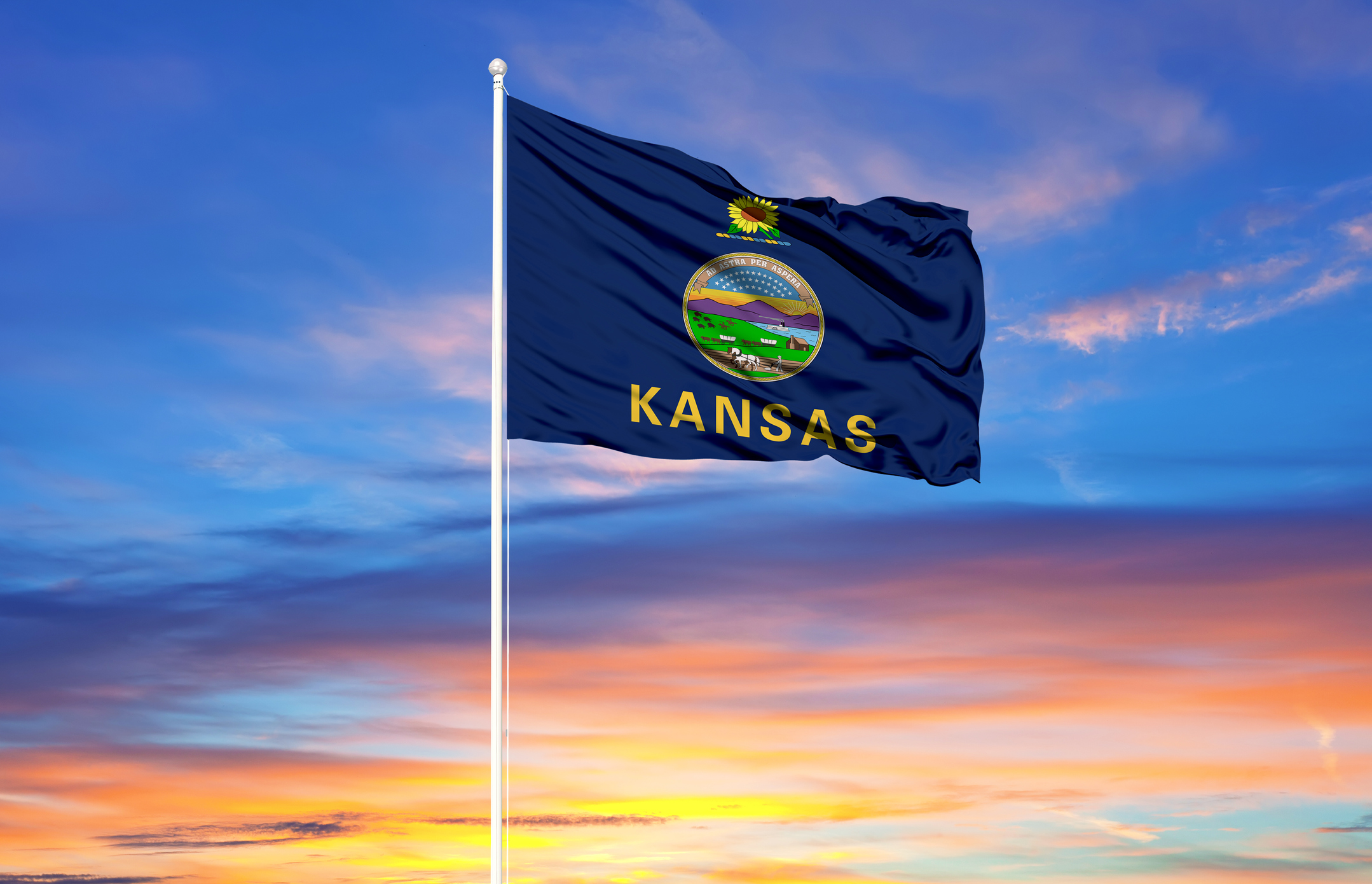Kansas Tax Guide
Explore Kansas's state tax rates for income, sales, property, retirement, and more. Learn how Kansas compares nationwide.

Katelyn Washington

Profit and prosper with the best of Kiplinger's advice on investing, taxes, retirement, personal finance and much more. Delivered daily. Enter your email in the box and click Sign Me Up.
You are now subscribed
Your newsletter sign-up was successful
Want to add more newsletters?

Delivered daily
Kiplinger Today
Profit and prosper with the best of Kiplinger's advice on investing, taxes, retirement, personal finance and much more delivered daily. Smart money moves start here.

Sent five days a week
Kiplinger A Step Ahead
Get practical help to make better financial decisions in your everyday life, from spending to savings on top deals.

Delivered daily
Kiplinger Closing Bell
Get today's biggest financial and investing headlines delivered to your inbox every day the U.S. stock market is open.

Sent twice a week
Kiplinger Adviser Intel
Financial pros across the country share best practices and fresh tactics to preserve and grow your wealth.

Delivered weekly
Kiplinger Tax Tips
Trim your federal and state tax bills with practical tax-planning and tax-cutting strategies.

Sent twice a week
Kiplinger Retirement Tips
Your twice-a-week guide to planning and enjoying a financially secure and richly rewarding retirement

Sent bimonthly.
Kiplinger Adviser Angle
Insights for advisers, wealth managers and other financial professionals.

Sent twice a week
Kiplinger Investing Weekly
Your twice-a-week roundup of promising stocks, funds, companies and industries you should consider, ones you should avoid, and why.

Sent weekly for six weeks
Kiplinger Invest for Retirement
Your step-by-step six-part series on how to invest for retirement, from devising a successful strategy to exactly which investments to choose.
Kansas state tax: Overview
Kansas can be a moderately tax-friendly state for certain retirees, particularly those with a public pension income.
Residents of the Sunflower State are fully exempt from taxes on their public pension. Not to mention: Kansans' tax savings recently got even better thanks to a new landmark tax relief package signed into law last year.
As reported by Kiplinger, Gov. Laura Kelley signed a measure that eliminated Kansas's tax on Social Security income, reduced property and income taxes, and is set to increase the state standard deduction and child and dependent care credit. The new legislation is projected to usher in nearly $2 billion in tax cuts for Kansans over the next 5 years.
From just $107.88 $24.99 for Kiplinger Personal Finance
Become a smarter, better informed investor. Subscribe from just $107.88 $24.99, plus get up to 4 Special Issues

Sign up for Kiplinger’s Free Newsletters
Profit and prosper with the best of expert advice on investing, taxes, retirement, personal finance and more - straight to your e-mail.
Profit and prosper with the best of expert advice - straight to your e-mail.
On the downside, Kansas does carry a high sales tax. The state is the ninth most expensive in the nation when considering average combined state and local sales taxes.
However, some taxpayers might consider Kansas income tax rates a positive, depending on how much they earn and where those earnings come from.
[Data for this state tax guide was gathered from a number of sources including the Census Bureau, the state’s government website, and the Sales Tax Handbook. Property taxes are cited as a rate percentage rather than the assessed value.]
Kansas income taxes

Kansas has a graduated state individual income tax rate ranging from 3.10% to 5.70%.
Kansas Republican lawmakers recently enacted a flat income tax plan over the veto of Democratic Gov. Laura Kelly. Senate Bill 269 would reduce income taxes to a single rate of 4%, according to local reports.
Gov. Kelly said in a statement that the income tax cuts would cost the state up to $1.3 billion annually.
However, Kansas has an "intangibles tax" levied on unearned income (for example, income from savings accounts, stocks, and bonds) by some localities.
Kansas retirement taxes
Kansas income taxes in retirement: Kansas is no longer one of the states that tax Social Security retirement benefits. A broad tax relief package signed by Gov. Kelly went into effect in June 2024, eliminating state taxes on Social Security income in Kansas.
Income from federal government-designated Kansas state and local government, as well as military retirement plans, is tax-exempt. Railroad benefits are also exempt.
- Social Security: Partially taxable (Exempt for retires with an AGI of $75,000 or less)
- Pensions: Taxable (Public pensions are exempt)
- 401(k) and IRA Distributions: Taxable
Kansas sales tax

The statewide levy is 6.5%. Localities can add as much as 5%, and the average combined rate is 8.77%, according to Tax Foundation data.
Kansas repealed its grocery sales tax in 2025, but a local sales tax will still apply.) The elimination of the state sales tax on groceries is expected to save shoppers $13 million per month this year, according to the governor's office.
- Clothing: Taxable
- Prescription drugs: Taxable
- Clothing: Taxable
How much are property taxes in Kansas?

The average effective property tax rate in Kansas is 1.26%. However, Kansas offers programs that can help some homeowners reduce their property taxes.
Kansas Property Tax Breaks for Retirees
SAFESR: Some homeowners may be eligible for the ‘Kansas Property Tax Relief for Low Income Seniors’ or SAFESR. The program offers a property tax refund program equal to 75% of the property taxes paid. Kansas requires that taxpayers meet specific criteria to qualify.
Additionally, taxpayers can claim either the Homestead or SAFESR refund, not both.
Kansas gas tax

Gasoline | $0.24 per gallon |
Diesel | $0.26 per gallon |
Kansas taxes on alcohol and tobacco
Product | Tax amount |
|---|---|
Cigarettes | $1.29 per pack |
Other tobacco products | 10% of wholesale price |
Source: Sales Tax Handbook
Product | Tax amount |
|---|---|
Wine | $0.30 per gallon |
Beer | $0.18 per gallon |
Liquor | $2.50 per gallon |
Source: Sales Tax Handbook
Kansas estate and inheritance taxes
There is no estate tax or inheritance tax in Kansas.
Related Content
Profit and prosper with the best of Kiplinger's advice on investing, taxes, retirement, personal finance and much more. Delivered daily. Enter your email in the box and click Sign Me Up.

Gabriella Cruz-Martínez is a finance journalist with 8 years of experience covering consumer debt, economic policy, and tax.
Gabriella’s work has also appeared in Yahoo Finance, Money Magazine, The Hyde Park Herald, and the Journal Gazette & Times-Courier.
As a reporter and journalist, she enjoys writing stories that empower people from diverse backgrounds about their finances, no matter their stage in life.
- Katelyn WashingtonFormer Tax Writer
-
 Quiz: Do You Know How to Avoid the "Medigap Trap?"
Quiz: Do You Know How to Avoid the "Medigap Trap?"Quiz Test your basic knowledge of the "Medigap Trap" in our quick quiz.
-
 5 Top Tax-Efficient Mutual Funds for Smarter Investing
5 Top Tax-Efficient Mutual Funds for Smarter InvestingMutual funds are many things, but "tax-friendly" usually isn't one of them. These are the exceptions.
-
 AI Sparks Existential Crisis for Software Stocks
AI Sparks Existential Crisis for Software StocksThe Kiplinger Letter Fears that SaaS subscription software could be rendered obsolete by artificial intelligence make investors jittery.
-
 How to Open Your Kid's $1,000 Trump Account
How to Open Your Kid's $1,000 Trump AccountTax Breaks Filing income taxes in 2026? You won't want to miss Form 4547 to claim a $1,000 Trump Account for your child.
-
 In Arkansas and Illinois, Groceries Just Got Cheaper, But Not By Much
In Arkansas and Illinois, Groceries Just Got Cheaper, But Not By MuchFood Prices Arkansas and Illinois are the most recent states to repeal sales tax on groceries. Will it really help shoppers with their food bills?
-
 7 Bad Tax Habits to Kick Right Now
7 Bad Tax Habits to Kick Right NowTax Tips Ditch these seven common habits to sidestep IRS red flags for a smoother, faster 2026 income tax filing.
-
 10 Cheapest Places to Live in Colorado
10 Cheapest Places to Live in ColoradoProperty Tax Looking for a cozy cabin near the slopes? These Colorado counties combine reasonable house prices with the state's lowest property tax bills.
-
 New Gambling Tax Rule Impacts Super Bowl 2026 Bets
New Gambling Tax Rule Impacts Super Bowl 2026 BetsTaxable Income When Super Bowl LX hype fades, some fans may be surprised to learn that sports betting tax rules have shifted.
-
 Should You Do Your Own Taxes This Year or Hire a Pro?
Should You Do Your Own Taxes This Year or Hire a Pro?Taxes Doing your own taxes isn’t easy, and hiring a tax pro isn’t cheap. Here’s a guide to help you figure out whether to tackle the job on your own or hire a professional.
-
 Can I Deduct My Pet On My Taxes?
Can I Deduct My Pet On My Taxes?Tax Deductions Your cat isn't a dependent, but your guard dog might be a business expense. Here are the IRS rules for pet-related tax deductions in 2026.
-
 Don't Overpay the IRS: 6 Tax Mistakes That Could Be Raising Your Bill
Don't Overpay the IRS: 6 Tax Mistakes That Could Be Raising Your BillTax Tips Is your income tax bill bigger than expected? Here's how you should prepare for next year.